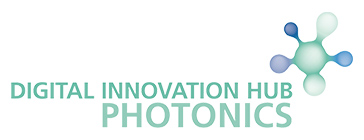January 12, 2023
On January 12th, DIHP invited photonics fans and founders to present their innovative research ideas and business projects at the fifth edition of the Elevator Pitch. Winning ideas aimed, for example, at curbing bee mortality, or were projects in bioanalytics or medical technology. The winning teams receive research budgets of around € 55,000 each.
In total, a budget of over € 275,000 was awarded for the Pitch 2023. Thanks to this consistent budget, the team’s ideas can be further developed at the five research institutes that are part of the Digital Innovation Hub Photonics.
Winning teams
The successful teams were all thrilled to invest their new research budgets at one of the five partner-institutes to further investigate their ideas:
- Laser-Flow – Dr. Tino Schenk and Dr. Sven Stengel (with the Abbe Center of Photonics (ACP):
This project aims at developing a novel high-throughput technique for the diagnosis and monitoring of single-cell changes in liquid biopsies.
- CompCam – Dr. Günter Weber, Dr. Uwe Spillmann and Wilko Middents (with the Helmholtz-Institute Jena):
This team plans a feasibility study of new types of X-ray imaging based on the Compton effect.
- On-site sensor technology (SustainIR) – Steffen Biermann (Leibniz IPHT) and colleagues from Micro-Hybrid Electronics GmbH, Hermsdorf:
With SustainIR, a new method is being developed to enable fast and fully automated on-site analysis using spectroscopy in the mid-infrared range (dispersive spectroscopy).
- ProDICAN – Christin Reimer, Dr. Johann Kufs and Prof. Falk Hillmann (with the Leibniz-HKI):
Cannabinoidis can be produced in cultures of slime molds under controlled conditions: ProDICAN is dedicated to the observation and control of this process, using optical methods.
- BeeSupervisor– Philipp Landwehr, Albert Dehne and team (with the Fraunhofer IOF):
This project is developing an optical detention system to identify the infestation of a beehive with the parasite Varroa destructor (Varroa mite). Varroa mites are responsible for most of the global decline in bee populations.
"Crowd-Innovation" Award
Additionally, three more teams were given the opportunity to further develop their ideas on "Crowd Innovation" – e.g., through market feedback – in collaboration with the Fraunhofer Center for International Management and Knowledge Economy IMW. The teams are:
- "Situation analysis around the patient bed" – Tobias Gebhardt, Marcel Walz, and colleagues for GWA Hygiene GmbH, Stralsund:
Determining whether a patient is securely in their bed or has experienced a fall, assessing if nursing staff are present at the bedside, or if the patient is alone – these questions are intended to be addressed by a universal sensor unit, enabling a situational analysis around the hospital bed.
- "BeeSupervisor" – Philipp Landwehr, Albert Dehne and team :
Developing an optical detection system to identify infestations of a beehive with the parasite Varroa destructor (Varroa mite) as part of the project.
- "EnLight" – Dr. Jan Sperrhake, Prof. Maria Mittag, Michael Steinert, Dr. Jan Petersen and Prof. Thomas Pertsch:
This project is dedicated to the development of nanostructures on glass chips with multiple chambers of varying environmental conditions and microbe cultures migrating between them.
Composition of the jury
The selection of the award-winning teams was carried out by an expert panel composed of representatives from various institutions in business and science. This jury included representatives from companies such as JENOPTIK, industry associations, transfer experts from participating institutions, and notably, experienced entrepreneurs like Peggy Bärenklau (heracle GmbH) and Dr. Peter Miethe (Posanova GmhH). Dr. Claudia Reinlein, who presented her ideas for the first time at the DIHP Pitch in 2020 and later founded ROBUST AO GmbH, was also a member of the jury. Reflecting on this year's pitch, she remarked, "It's particularly exciting for me, after three years, to now sit on the jury and hear so many interesting topics."
Jury members
- Sven Kiontke, asphericon GmbH & BACJ e.V.
- Dr. Claudia Reinlein, Robust AO GmbH
- Stefan Jahn, bm-t beteiligungsmanagement thüringen gmbh
- Dr. Peter Miethe, posanova GmbH
- Peggy Bärenklau, heracle GmbH
- Dr. Ekkehard Werner, JENOPTIK Optical Systems GmbH
Representatives of the institutions involved in the DIHP+ consortium project
- Dr. Ramona Eberhardt, Fraunhofer IOF
- Dr. Falk Eilenberger, Abbe Center of Photonics (ACP) @ FSU Jena
- Dr. Michael Ramm, Leibniz-HKI
- Dr. Andreas Wolff, Leibniz-IPHT
- Dr. Joachim Hein, Helmholtz Institute Jena
- Dr. Robin Bürger, Fraunhofer IMW (Crowd Innovation)
Thank you also to the present guests and supporters of the DIHP Pitch 2023!
 Fraunhofer Institute for
Fraunhofer Institute for